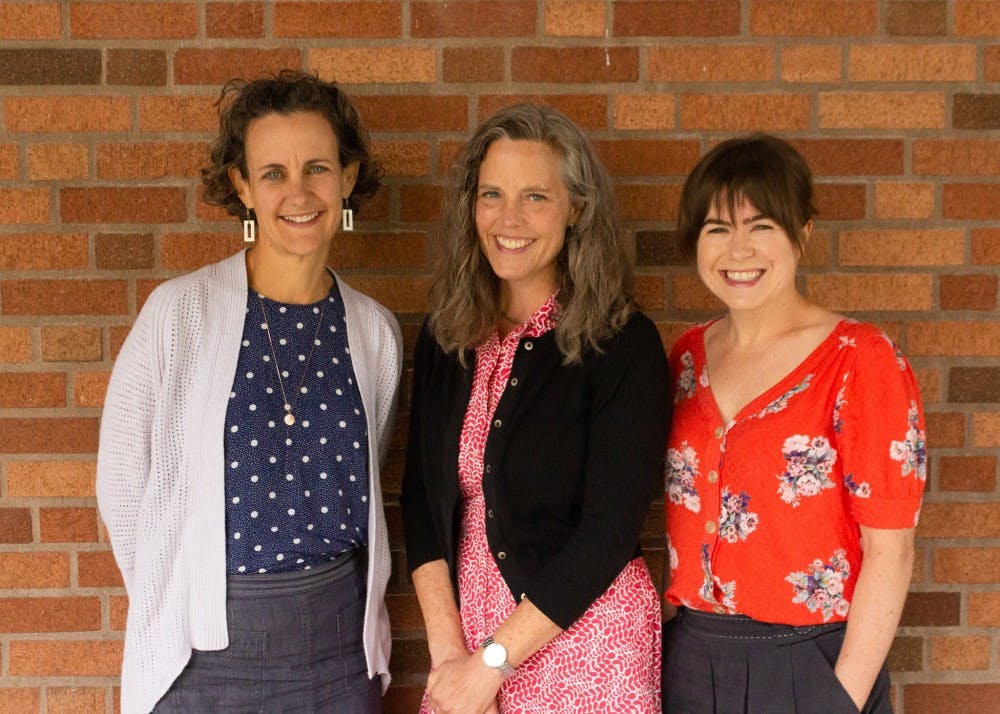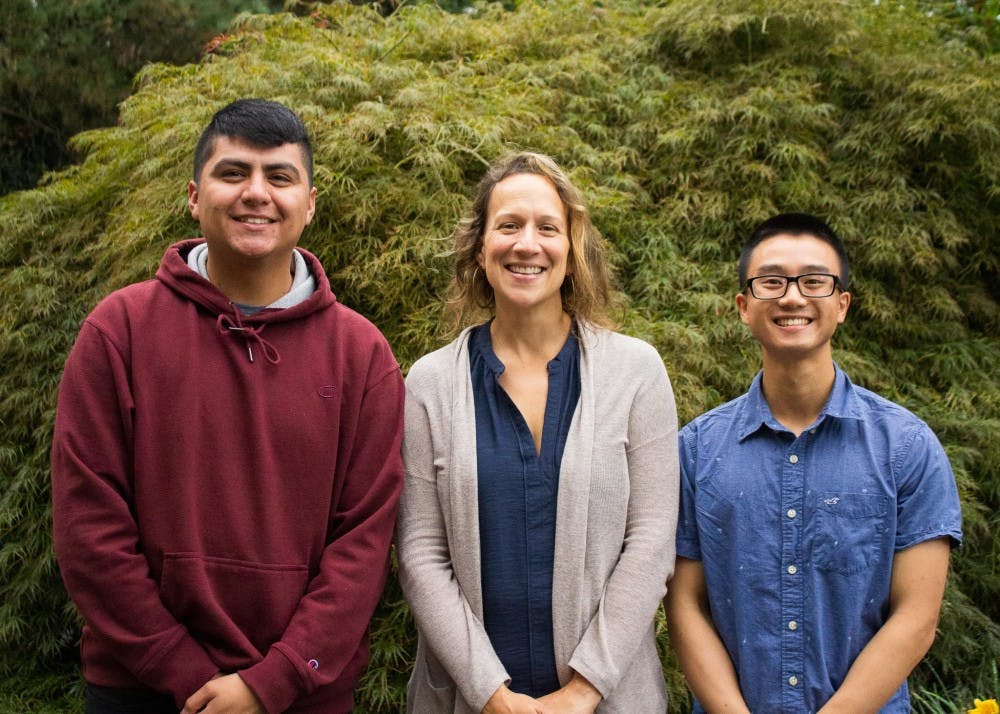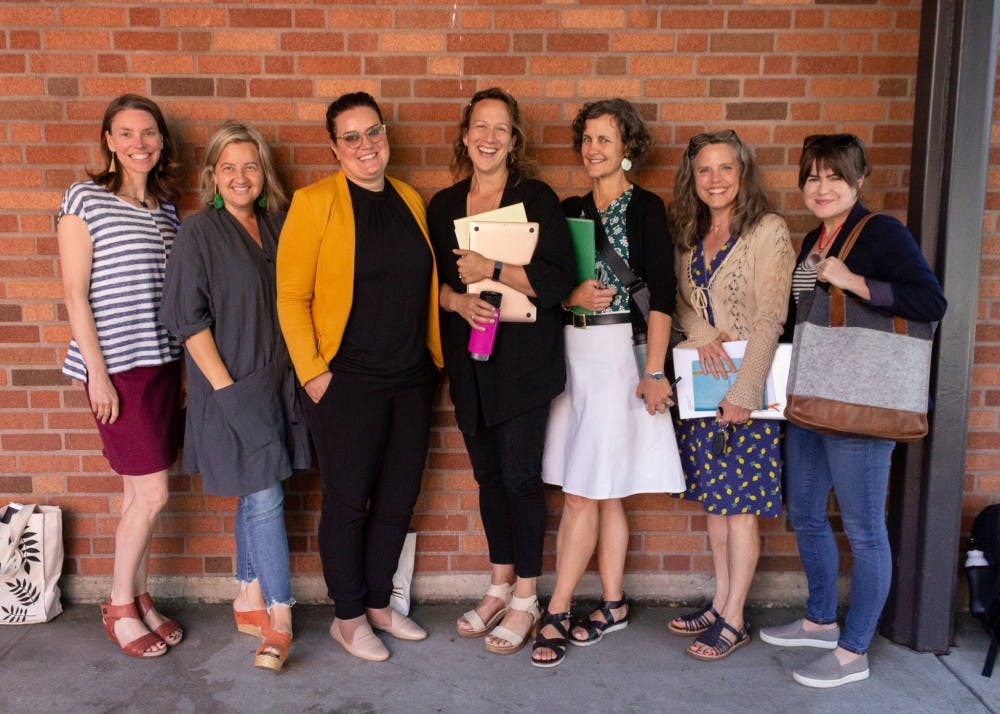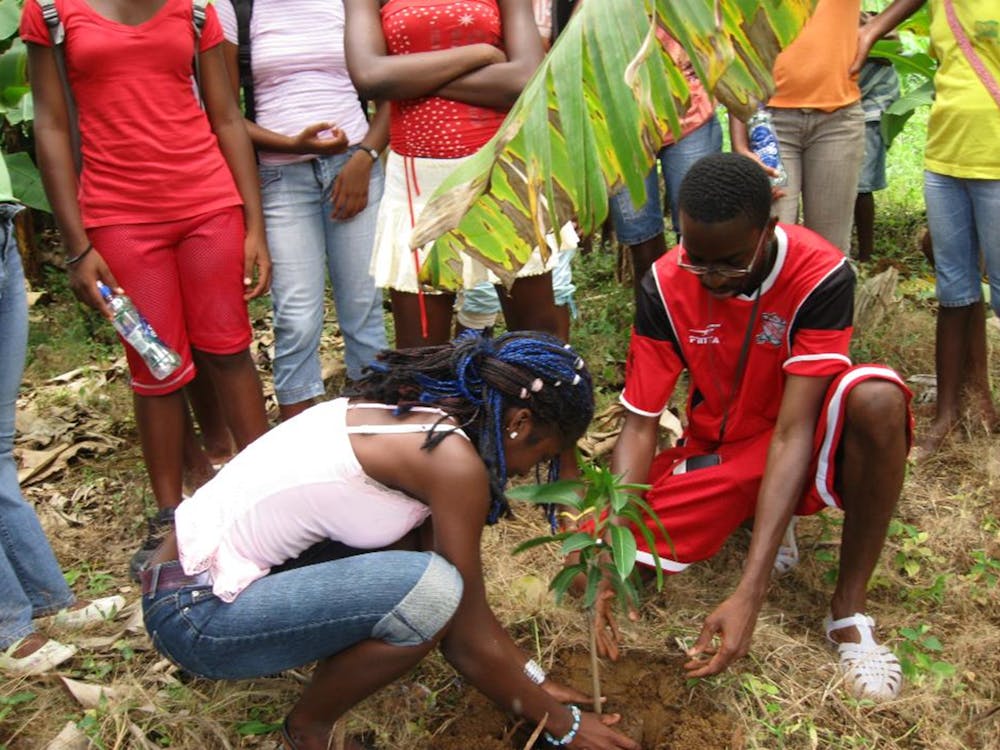The 2019-20 academic year will host the inaugural Public Research Fellows program at the University of Portland, centered on the centennial of U.S. women’s suffrage.
The core of the program will be publicly-engaged research projects led by professors and students alongside other events culminating in an on-campus symposium in March 2020. The program officially begins on Sept. 23 with a lecture by history professor Christi Hancock on the history of women’s suffrage in the U.S. The UP community can follow along this year through the program’s website, which is set to launch in the coming weeks.
The Public Research Fellows program emerged from an organization called the Humanities Collaborative, explained German studies professor and Academic Associate Dean of the College of Arts and Sciences Laurie McLary. Working with English professor Molly Hiro and theology professor Carol Dempsey, she created the Humanities Collaborative in 2016 through her role in the dean’s office and planned for it to mirror, in some ways, humanities institutes or centers at other universities.

From left to right, professsors Molly Hiro, Laura McLary and Jen McDaneld are the faculty organizers behind the Public Research Fellows program.
In developing the organization, the professors also aimed to create a year-long program focused on a particular theme or question that would emphasize undergraduate research outside of STEM fields, especially in the humanities, and clearly engage with the public.
McLary noted that she thinks the tools of the humanities are critical in all disciplines, which is why the Public Research Fellows program is not limited to humanities professors and students.
“The point is to show that a lot of the methods, dispositions and tools that we use in the humanities are definitely infused into other disciplines as well,” McLary said. “Imagine a university or any discipline without the infusion of the humanities.”
Hiro, another faculty organizer of the program, described what she considers some of the key characteristics of the humanities and why she values its approaches.
“Humanities as a whole generally prioritizes questions over answers, multiplicity and even ambiguity over clarity and certainty, and thinking with multiple lenses at a time,” Hiro said.
Last year, English professors Hiro and Jen McDaneld approached the Humanities Collaborative with McDaneld’s research in suffragist literature and interest in the women’s suffrage centennial. The timing of the centennial and the formation of the Humanities Collaborative seemed opportune to them, and Hiro, McDaneld and McLary became the faculty organizers of the inaugural program.
Hiro also spoke to the more nuanced celebration and historical image that has emerged around the 19th Amendment and has reframed it as a victory primarily for white women.
“You can’t merely celebrate this movement,” Hiro noted.
McDaneld also pointed out the complexities in discussing and remembering the women’s suffrage movement in the U.S.
“On the one hand, is it problematic to commemorate a movement that was very incomplete, not diverse, and at times woefully racist?” McDaneld said. “I was concerned that people weren’t thinking about examining it at all because of those problematic aspects whereas, we have a lot to learn from that.”
Six faculty-student teams will conduct a wide variety of research using the centennial as their prompt. The faculty fellows and their students are from many disciplines, including English, history and political science.

Senior Eric Berrelleza (left), Professor Alice Gates (middle) and senior Brian Phan (right) are conducting research on expanding the right to vote to 16-year-olds. They are curious to explore the advantages and downsides of lowering the voting age.
Social work professor and faculty fellow Alice Gates will research lowering the voting age to 16 years old in Oregon and other states, inspired by the proposals of representatives like Oregon state Senator Shemia Fagan and Massachusetts congresswoman Ayanna Pressley. Their research will involve organizing focus groups or using photovoice in different parts of Portland.
“Over the years, our idea of what voting means has changed,” said student researcher and senior biology major Brian Phan. “Women couldn’t vote because people thought they were incapable of thinking and making sound judgments. Same for minorities, and now, people younger than 18. It’d be good to explore and see if we can get a larger group of voters.”
Erick Berrelleza, a student researcher and senior political science and Spanish major, explained that it’s easy for many people to discard the prospect of lowering the voting age by citing teenagers’ supposed lack of knowledge and maturity. However, the topic has rarely been researched, so he thinks that people shouldn’t be so secure in their claims against it. He also pointed out that voting holds different meaning for different communities.
“For immigrants, it’s an opportunity for somebody in their household to have a voice, and it starts with their children being first-generation students,” Berrelleza said. “They can wait until they’re 18, but it’s more exciting when it comes sooner. So, to a ton of people, this means a lot more than to others.”
The student researchers earn one credit for the research itself and are also enrolled in a one-credit reading course this semester taught by McDaneld. The readings blend suffragist literature and conversations about public humanities engagement. The students will also take a one-credit course in the spring in which they reflect on their projects and learn more applied skills in preparation for the symposium, McDaneld explained.
“Suffragists were so deeply engaged with the public sphere because they wanted to influence it, (so we’re) thinking about them almost as models of public engagement,” McDaneld said.
The course involves analysis of suffragist and anti-suffragist arguments, discussion of suffragists’ campaigns (like their 1916 valentine campaign to congressmen), a behind-the-scenes look at the Oregon Historical Society’s centennial exhibit and more.
The Public Research Fellows program officially ends with the symposium in March 2020, which includes a roundtable with local experts and politicians and a keynote address by Brittney Cooper, a Rutgers University professor and the author of “Eloquent Rage: A Black Feminist Discovers Her Superpower.”
The Public Research Fellows program prioritizes public engagement and aims for the program’s research and conversations to be accessible to the campus community and the wider public. The symposium format will differ from that of traditional academic presentations, Hiro said. The faculty organizers hope to display projects in the lobbies of buildings and for students to give short presentations or directly engage with people passing by to reach as many people as possible.
“The idea is to think of presentation in a different style, for it to not just be a ‘sage on the stage’ kind of thing,” Hiro said.
The faculty organizers have encouraged professors to incorporate the theme of the Public Research Fellows program into their courses and also want to motivate students to attend as many events as possible and understand the value of the humanities, regardless of their disciplines.
“Those questions of human concern — what does it mean to be human, to live in a community, to be ethically and morally responsible to others in your community — those are all questions that are at the basis of the humanities,” McLary said. “When we talk about issues of social justice, those are humanities-based questions as well.”
The fall kickoff of the Public Research Fellows program starts on Monday, Sept. 23 from 4 p.m. to 5:30 pm in the Bauccio Board Room with a lecture by history professor Christi Hancock.
Dora Totoian is a reporter and the Opinion editor for The Beacon. She can be reached at totoian20@up.edu.








